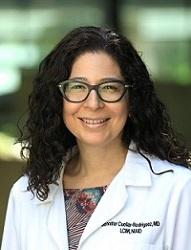
Major Areas of Research
- Infections in immunocompromised host
- Transplant for primary immunodeficiencies
Program Description
The Transplant Infectious Diseases Consult Service is composed of experienced transplant infectious diseases physicians. In collaboration with the Blood and Immune Deficiency Cellular Therapy Program (BID-CTP), a clinical initiative that spans across four institutes within NIH, and with the Experimental Transplantation and Immunology Branch (ETIB), the consult service provides direct patient care, educational support and develops institutional guidelines for the prevention and management of infections for patients undergoing hematopoietic stem cell transplant, gene or cellular therapies at the NIH clinical center.
Biography
Dr. Cuellar Rodriguez received her medical degree from the Universidad Autónoma de Guadalajara (Guadalajara, Mexico) in 1999 and her Diploma in Tropical Medicine and Hygiene from the London School of Hygiene and Tropical Medicine (London, UK) in 2003. She completed an Internal Medicine residency and Infectious Diseases fellowship at the at the Instituto Nacional de Ciencias Médicas y Nutrición Salvador Zubirán (INCMNSZ) in Mexico City, followed by a Clinical Fellowship in Transplant Infectious Diseases at the Cleveland Clinic in Cleveland, OH. In 2009, she joined NIAID as a clinical fellow (visiting program) where she completed an advanced infectious diseases fellowship (academic/research track) in infections in immunocompromised host. She was later promoted to staff clinician in 2011. In 2014, Dr. Cuellar Rodriguez returned to the INCMNSZ to serve as head of the Transplant Infectious Diseases Section, within the Department of Infectious Disease, where she remained until 2019. She then returned to NIAID in the Division of Intramural Research and is now the director of the Transplant Infectious Diseases Consult Service.
Research Group
Juan Gea-Banacloche, M.D., Staff Clinician
Mark Parta, M.D., MPHTM, Physician III
Publications
Training Program(s)
The Transplant Infectious Diseases Consult Service is composed of experienced transplant infectious diseases physicians. In collaboration with the Blood and Immune Deficiency Cellular Therapy Program (BID-CTP), a clinical initiative that spans across four institutes within NIH, and with the Experimental Transplantation and Immunology Branch (ETIB), the consult service provides direct patient care, educational support and develops institutional guidelines for the prevention and management of infections for patients undergoing hematopoietic stem cell transplant, gene or cellular therapies at the NIH clinical center.
- Survey of Pneumocystis Infections in NIH patients, Principal Investigator
- A Phase II Study of Allogeneic Hematopoietic Stem Cell Transplant for Subjects with VEXAS (Vacuoles, E1 enzyme, X-linked, Autoinflammatory, Somatic) Syndrome, Associate Investigator
- A Phase II Study of Allogeneic Hematopoietic Stem Cell Transplant for Patients with Primary Immunodeficiency Diseases, Associate Investigator
- Detection and Characterization of Host Defense Defects, Associate Investigator
- Allogeneic Hematopoietic Stem Cell Transplant for Patients with Mutations in GATA2 or the MonoMAC syndrome, Associate Investigator
- Screening Protocol for Detection and Characterization of Infections and Infection Susceptibility, Associate Investigator
- Natural History Study of the Complications Associated with Allogeneic Hematopoietic Stem Cell Transplantations, Associate Investigator
Research Group
- Juan Gea-Banacloche, M.D., Staff Clinician
- Mark Parta, M.D., MPHTM, Physician III
Training Program
- Infections in immunocompromised host
- Transplant for primary immunodeficiencies
NIAID Select Agent Research Awards Process
NIAID staff and awardees use this process in conjunction with the related Select Agent Awards SOP.
Follow the steps shown in the sections below:
NBBTP/IRTA Stipends and Benefits
In addition to the intensive leadership development and professional growth that the Fellowship offers, the National Biosafety and Biocontainment Training Program (NBBTP)/Intramural Research Training Award (IRTA) Fellowship includes the following benefits. The NBBTP/IRTA arranges several logistical details on Fellows’ behalf with the expectation that Fellows will take ownership of their overall experience. Read on below to learn more about how these items apply:
NBBTP/IRTA Fellowship Program Eligibility
Application Procedure for the NBBTP/IRTA Fellowship
NBBTP/IRTA Contact Information
We appreciate your interest in this rigorous biosafety and biocontainment training program. We will address all correspondence promptly. For questions you may have about the National Biosafety and Biocontainment Training Program (NBBTP)/Intramural Research Training Award (IRTA) Fellowship, please contact:
Email: NBBTP@nih.gov
NIH Division of Occupational Health & Safety
Phone: (301) 496-2960
NBBTP/IRTA Current Fellows and Alumni
NBBTP/IRTA Fellows are trained specifically to support high containment research environments. Upon graduating from the program, NBBTP/IRTA alumni begin work as biorisk professionals with the knowledge and skills necessary to meet the scientific, regulatory, biocontainment, biosafety, engineering, communications, management, and public relations challenges associated with the conduct of research in these facilities.
Learn more about current NBBTP/IRTA Fellows and Alumni:
NBBTP/IRTA Professional Development
Curriculum Overview
The NBBTP/IRTA curriculum is based on seven core components: Biosafety; Biocontainment; Biosecurity; Occupational Health and Safety; Animal Health and Safety, Leadership and Management, and Applied Research. Through mentored didactic and experiential learning opportunities, Fellows will learn principles and practices that will build their knowledge and confidence as biorisk professionals.
About NBBTP/IRTA
The National Biosafety and Biocontainment Training Program (NBBTP)/Intramural Research Training Award (IRTA) offers two-year postbaccalaureate and postdoctoral fellowships.
Some Deadlines Are Before the Application Due Date
If you plan to apply for a grant, your opportunity’s due date may not be the only one you need to know. You may also have special institutional and NIH deadlines in the weeks or months before you apply.

